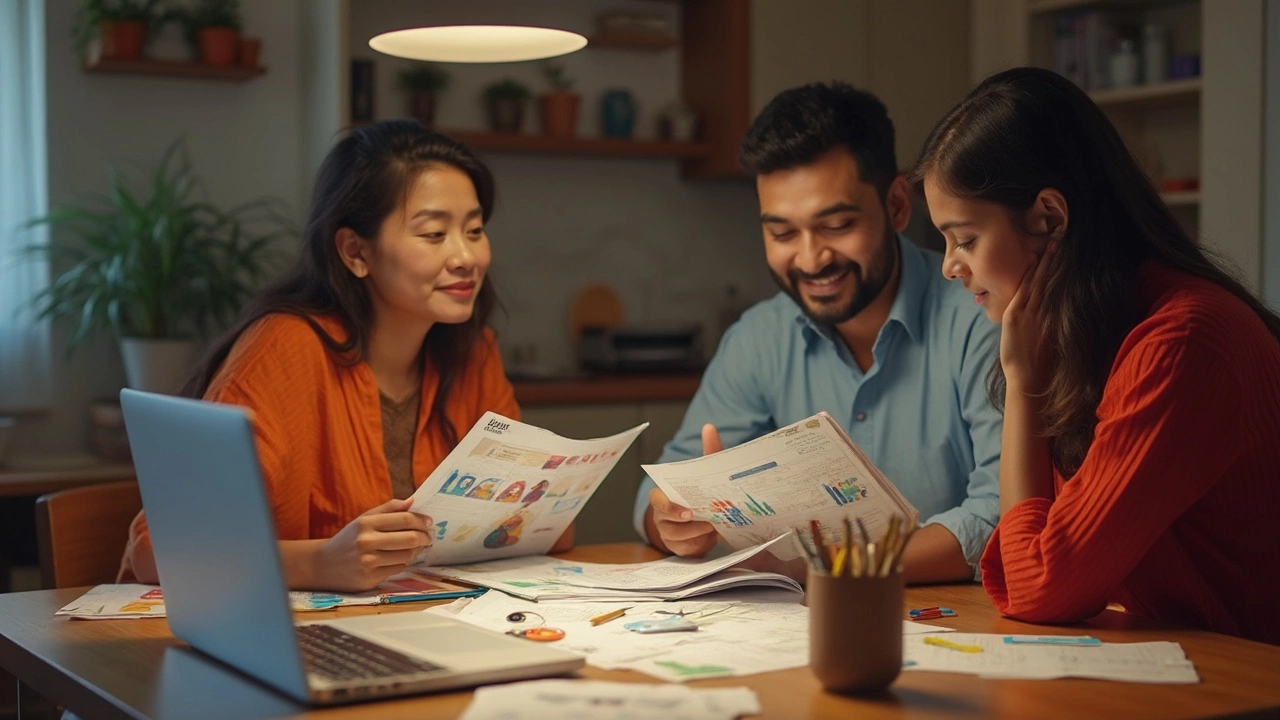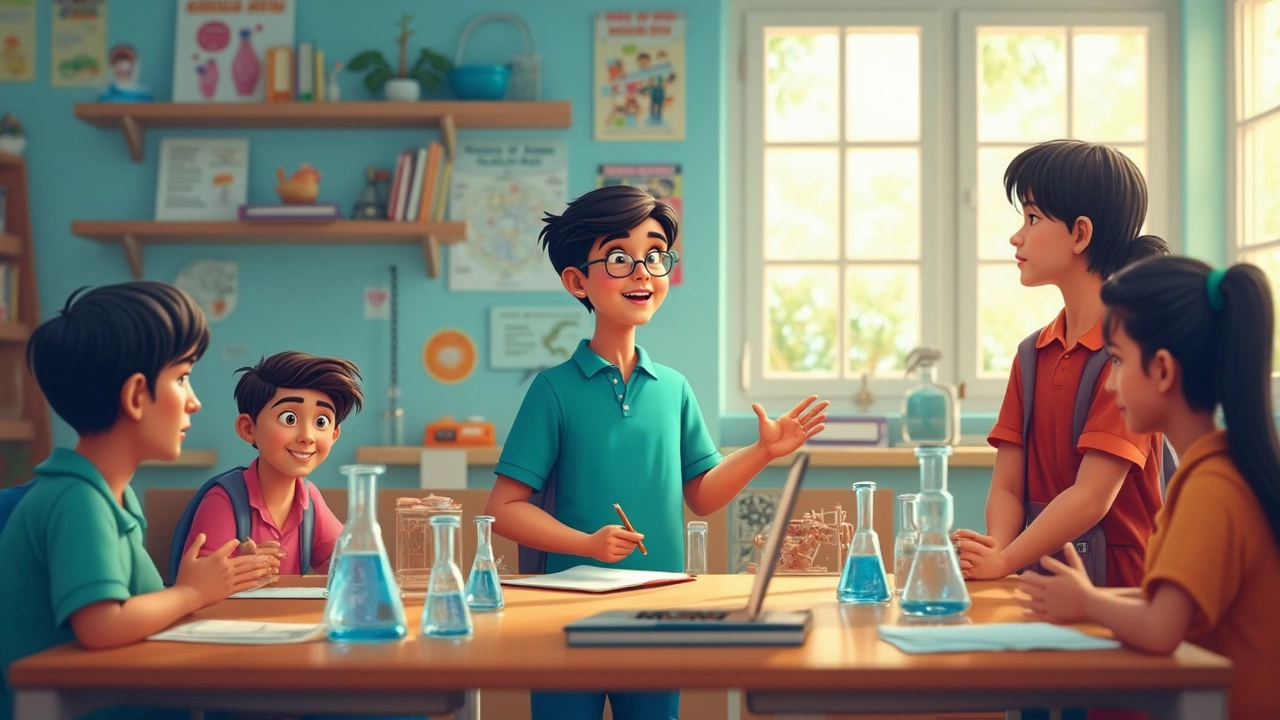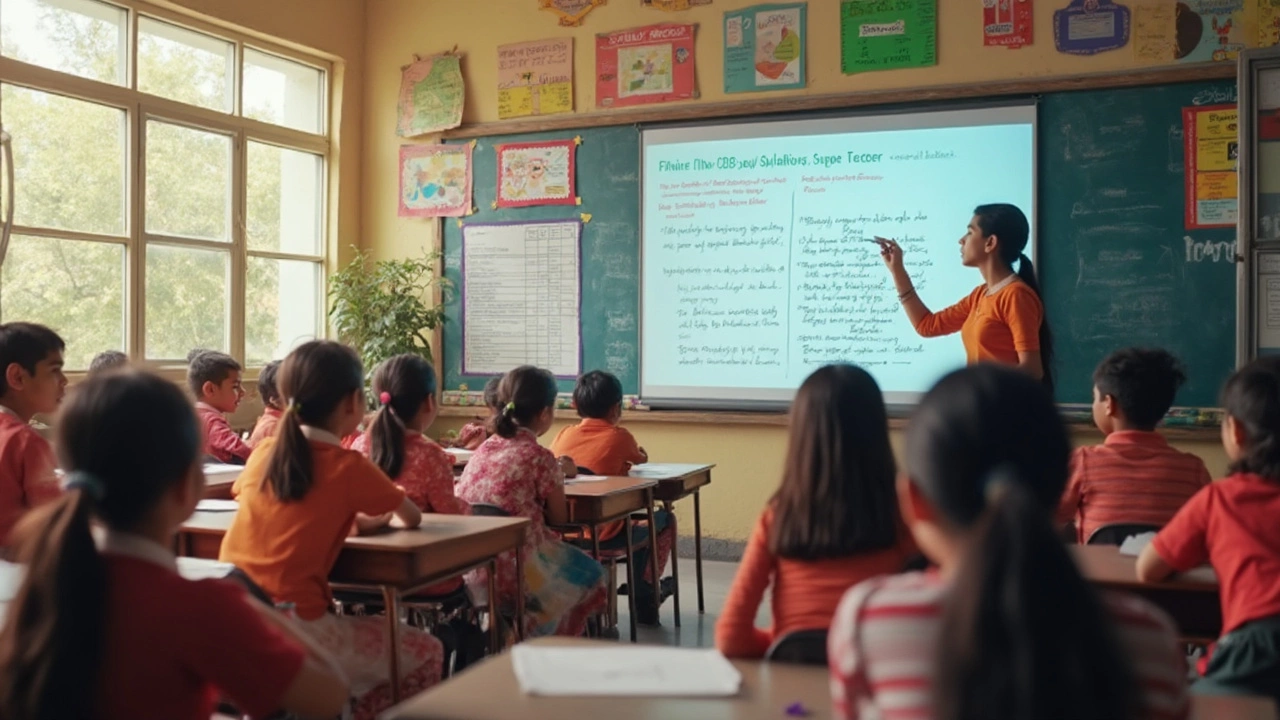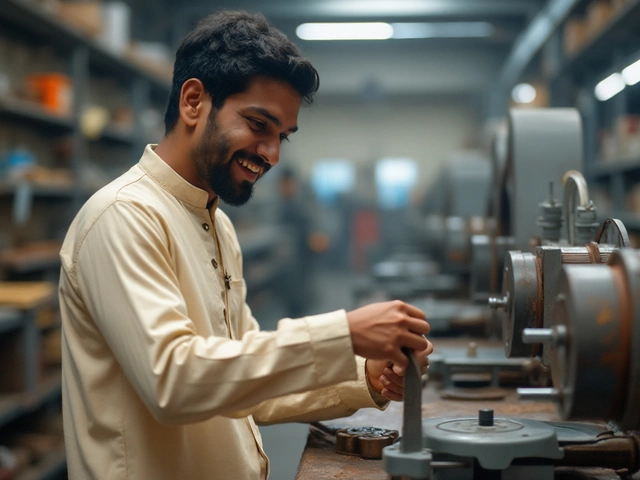Parents get flooded with advice when choosing a school board, but most folks just want an answer to one big question: which board actually gives kids a better shot at a solid future? Skip the hype. Whether you’re looking at your child's first step into schooling or thinking ahead to college, your pick of board seriously matters.
The CBSE syllabus pops up everywhere—and for a reason. Almost every competitive exam in India, from engineering to medicine, follows its style. This board promotes science, math, problem-solving, and English skills that line up pretty well with what universities want. But does that mean CBSE is the holy grail for every kid? Spoiler: it's not one-size-fits-all.
Before you make that call, you’ve got to know what the CBSE board actually does, how it stacks up next to others, and why its syllabus keeps showing up in so many parents’ Google searches. I've seen a ton of parents get overwhelmed by textbooks, teaching styles, and rumors about board advantages. Let’s break it down and keep it real.
- What Exactly Is CBSE and How Does It Work?
- How Does CBSE Compare to Other Boards?
- Does CBSE Prepare Kids for Real Life?
- Tips for Picking the Right Board for Your Child
- Myths People Believe About CBSE
What Exactly Is CBSE and How Does It Work?
When you hear about the CBSE board, it stands for Central Board of Secondary Education. It’s not just some local school thing—it’s a national board, managed by the Indian government. Basically, it sets the playbook for thousands of schools across India and even out in places like the Middle East and Singapore.
CBSE’s job is to keep things standard so that whether your kid is studying in Mumbai or Dubai, the textbooks and lessons won’t change much. The board covers classes from pre-primary (junior KG) up to Grade 12. The big draw? Its syllabus is used for national-level competitive exams like JEE (for engineering) and NEET (for medicine). So if your kid wants to aim high, CBSE syllabus lines up straight with those entrance exams.
You might hear people say CBSE is all about science and math. That’s pretty accurate, but it also offers subjects like humanities, commerce, and vocational courses. There’s a real focus on practical learning and problem-solving. No cramming random facts just to pass exams—at least, that’s the goal.
The grading follows a CCE pattern (Continuous and Comprehensive Evaluation) in lower classes, which means kids are tested through projects, activities, and written tests. In high school, it’s more about board exams at Grade 10 and 12, with set question papers and mark schemes made by CBSE itself.
| CBSE Key Features | Details |
|---|---|
| Number of Schools | Over 28,000 in India and abroad |
| Subjects Offered | Science, Math, English, Social Science, IT, Commerce, Humanities, more |
| Type of Exams | Board exams, competitive entrance exams aligned |
| Focus Areas | Conceptual understanding, practical skills, standard curriculum |
If you’re a parent who might move cities (thanks to job transfers or other reasons), CBSE usually makes life a lot simpler. Switching schools is easier because the books, subjects, and syllabus barely change.
How Does CBSE Compare to Other Boards?
If you’re looking at the CBSE syllabus, you’re not alone. Most schools across India, and a ton of Indian schools abroad, use it. But how is it actually different from boards like ICSE, state boards, or international ones like IGCSE?
CBSE vs ICSE: CBSE focuses more on science and math, built around what’s needed for major Indian entrance exams (like JEE or NEET). ICSE dives deeper into English and social sciences. ICSE’s project work and assessments are tougher, but CBSE’s format is a lot friendlier if your kid plans to move between states—the textbooks and curriculum don’t change much nationwide.
- Language: CBSE offers Hindi and English as core, while ICSE requires English at a high level.
- Exams: CBSE’s exams are more objective and straightforward. ICSE has a lot of descriptive questions and internal projects.
- Transfers: CBSE is consistent across regions, so kids won’t struggle if families move.
CBSE vs State Boards: State boards have regional content and local languages. Marks in state boards can sometimes seem a bit inflated. But, the flip side—if your child is eyeing central exams or needs mobility, CBSE gives them an edge. It lines up directly with most Indian competitive tests. State boards, though, may fit better if your family is settled in one state or your child is stronger in a regional language.
CBSE vs IGCSE/IB: International boards like IGCSE and IB focus on critical thinking and global skills. They’re great if you want your kid to study abroad. But honestly, these programs are pricey and not as widely available. CBSE is way more affordable and accepted by Indian colleges.
| Board | Main Focus | Exam Style | Mobility | Popular Exams Aligned |
|---|---|---|---|---|
| CBSE | Science, Math, English | Objective, direct | High (nationally consistent) | JEE, NEET, NDA |
| ICSE | English, projects, variety | Descriptive, detailed projects | Medium | Some overlap |
| State Boards | Regional content | Varies | Low (different state to state) | Less aligned |
| IGCSE/IB | Global exposure, creativity | Projects, critical thinking | Depends | International |
If your priority is competitive exams or simple school switching, the CBSE syllabus makes life easier. The board’s structure reduces stress for both parents and kids who move from city to city. If you know your kid wants to stick around in India post school, CBSE checks most boxes for a straightforward, practical education.

Does CBSE Prepare Kids for Real Life?
Alright, let’s get straight to it: does the CBSE board actually help kids tackle the real world? The short answer? Yes, but there’s some fine print. The CBSE syllabus is heavy on theory, and you’ll spot its fingerprints all over major entrance tests like NEET and JEE. That gives students a leg up if they're chasing mainstream careers.
CBSE schools use a grading system that rewards understanding, not just cramming. The focus is on application-based questions, which means students can’t just memorize answers—they’ve got to know how to use what they learn. There’s regular project work, group activities, and a fair bit of hands-on science in the labs.
But here’s the tricky part: real life isn’t just about test scores. Things like communication, creative thinking, and social skills matter too. CBSE has started adding life skill topics—like health, mental wellness, and environmental awareness—to the curriculum. Schools run SUPW (Socially Useful Productive Work) activities where kids get involved in community projects, event management, or even basic gardening and cooking. This stuff is very much part of adulting later on.
Still, there’s always room to level up. Practical exposure is not as strong as in IB or Cambridge boards, which lean heavy on global perspectives and hands-on assignments. But if your kid is eyeing competitive exams or government jobs in India, CBSE prepares them in sync with the actual requirements.
| CBSE Skill Focus | Real-life Application |
|---|---|
| Critical Thinking | Helps in decision making, problem solving in college & career |
| Lab Experiments | Hands-on science practice; basics for medical/engineering fields |
| Life Skills Content | Managing health, finance, and social situations |
| Continuous Assessment | Teaches time management, steady progress—not last-minute cramming |
Bottom line: the CBSE board gives kids a strong academic base with some real-world ideas sprinkled in. But, as with everything, what really matters is how the school and teachers bring it to life. The board’s got the roadmap—parents and schools need to make sure kids actually walk the walk.
Tips for Picking the Right Board for Your Child
Getting stuck between CBSE, ICSE, and state boards? You’re not alone. Every family has a unique situation, and there’s no universal answer. Still, you can make a smarter choice if you focus on a few real-world factors, instead of the rumors floating around WhatsApp groups.
- Check the curriculum style: CBSE syllabus is known for being straightforward and structured. It matches most Indian entrance exams closely. ICSE digs deeper into English language and has a reputation for tougher marking. State boards are sometimes easier but might not match up with national exam needs.
- Think about your child's strengths: If your child enjoys science and maths, CBSE gives a clear road. Kids who love reading, literature, or real-world projects may find ICSE more up their alley.
- Consider family mobility: If you might move cities, CBSE is the easiest for a smooth transfer—most schools in India (and even some abroad) follow its curriculum.
- Look at teaching and testing methods: Does your child prefer clear, direct questions, or can they handle in-depth, analytical questions? CBSE sticks to the point. ICSE and IB boards sometimes require creative or longer answers.
- Future plans matter: Planning for exams like JEE, NEET, or government jobs? CBSE content matches these exams line-for-line. But if your child wants to go abroad, programs like IB or IGCSE might fit better.
Worried about numbers? Here’s a quick bite:
| Board | Number of Affiliated Schools (2024) |
|---|---|
| CBSE | 28,500+ |
| ICSE | 2,200+ |
| State Boards (total) | 150,000+ |
Finally, never ignore the school’s vibe. Even the "best" board can feel useless if the teachers aren’t good or your kid feels lost. Visit schools, talk to teachers, and see if their style matches your child's needs. Your pick isn’t set in stone either – switching boards in junior years is way easier than folks think.

Myths People Believe About CBSE
There are tons of rumors about the CBSE syllabus floating around in parent circles, social media chats, and even school meetings. Most of it? Not true. Here's what's really going on:
- CBSE is all about rote learning. That used to be true a decade back. But now, CBSE pushes for activity-based tasks and real-life application. When they changed the exam patterns, schools had to step up and add in logical, application-based questions instead of just memorization. Pick up a recent question paper, and you’ll notice way more case studies and HOTS (Higher Order Thinking Skills) questions.
- CBSE is only good for engineering or medical aspirants. Sure, the big entrance tests like NEET and JEE use the CBSE style, but that doesn’t mean arts or commerce students get ignored. Loads of students go into design, business, law, or humanities after studying CBSE, and do just fine. The board's English and math focus actually helps across most careers, not just science streams.
- International boards are always better than CBSE. Marketing works wonders! IB and Cambridge boards sound fancy, but they’re also tougher on the wallet. CBSE makes it easier for students to switch schools across the country, and its curriculum is friendlier for families who move around. For most Indian universities, being from CBSE is perfectly fine.
- CBSE doesn’t support creativity or critical thinking. Not true anymore. The new textbooks and projects are big on teamwork, research, and open-ended learning. Fun fact: since 2020, project work and internal assessments carry more weight, making students think beyond what’s written in their books.
- CBSE schools all teach the same way and have the same resources. Not all schools are built the same, even with boards in common. Some CBSE schools have brilliant sports and coding programs, while others might stick to the bare basics. Just because a school follows the CBSE syllabus doesn’t mean the teaching quality matches everywhere.
Check this out for some actual differences:
| Common Belief | Reality |
|---|---|
| CBSE only preps for science careers | All streams (arts, commerce, humanities) are supported |
| Mostly rote learning | Focus on applications and HOTS questions in recent years |
| Lacks creativity | Project-based and activity assessments are part of curriculum |
| Same teaching style everywhere | Big quality gap between schools, check their resources |
Bottom line? Don't trust everything you hear. If you want to know if CBSE is the best board for your kid's future, look at what's really offered—syllabus, teachers, and actual school experience. My advice: visit a couple of local CBSE schools and see what they’re actually doing. The reality might surprise you.





Write a comment